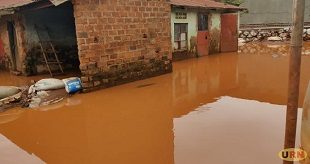
Kampala, Uganda | THE INDEPENDENT | A government plan to suspend the mass recognition of asylum seekers has been received with mixed reactions among refugees and asylum seekers in Blue room and Buwanika villages in Old Kampala. Many of them believe that the move will be used to curtail the fundamental rights and freedoms of asylum seekers.
The distress comes barely a week after the Office of the Prime Minister announced that that the mass recognition of refugees had been suspended on security grounds to prevent criminal activities. Initially, such groups of people were provided temporal protection for up to two years before they are asked to apply for refugees’ status in Uganda.
But under the new measures, the temporal two-year protection is effectively lifted and all asylum seekers will now be subjected to the full scope of application and status determination, a month after they arrive in the country.
Under the 2006 Refugee Policy, the status determination lasts up to 60-days after which the Refugees Eligibility Committee (REC), the government agency charged with screening and determining the status of refugees in the country, takes a decision granting or denying refugee status to an individual by written notice within two weeks.
The Committee grants refugee status during frequent sittings it conducts based on many factors including an applicant denouncing military activities, surrendering firearms, proper identification using travel documents and supply of proof beyond a reasonable doubt why he sought protection in the country and the gravity of the danger in the country of origin.
Those that are found to have participated in military activities in their country of origin are provided separate protection from their civilian counterparts in specially designated place outside the ordinary settlements under tight security watch.
Zelalem Genemu, 28, an asylum seeker who arrived in Uganda from Ethiopia in July says he fled ethnic violence in Western Ethiopia in the aftermath of the attempted coup which killed the country’s army chief of staff, General Seare Mekonnen through Kenya.
Zelalem arrived and settled in Blue Room village, where he lives in a small dilapidated shelter rented by his colleagues in the City’s sprawling informal settlement – also home to many Eritrean and Somali nationals. His interpreter who only identified himself as Rashid says they pay 80,000 Shillings for rent every month.
Zelalem and the group must in the meantime learn Luganda and English as they cope with the taste of Ugandan food while waiting to know their asylum status from the government under the new directive. He and his colleagues fear that the new directives could present a hurdle to their application.
Meles Magdala Asefa, a mother of three, also resident in Blue Room Village says most of the new arrivals live in isolation after Police raided the area arresting more than 10 Eritreans suspected of breaching immigration laws last week.
But despite the fear among refugee communities, Ter Manyang, a South Sudan refugee living in Buwanika Village in Kisenyi Parish, Old Kampala says he fully supports the government restriction of entry into Uganda. He says the new measure should be integrated with a durable solution to address the refugee crisis in the region.
Manyang says economic hardships associated with being a refugee can compel some of the asylum seekers to resort to crimes such as rape and prostitution.
Dorcas Amol, a Member of the Refugee Welfare Council in Pagirinya Refugee Settlement in Adjumani district cites the example of Kenya in saying Uganda will not be the first to restrict its border control to refugees.
Amol says in August, an unidentified man sneaked into Pagirinya Settlement to illegally traffic three of his children who were under the care of their mother back into volatile South Sudan without engaging settlement authorities and the Police. She says it was the vigilant immigration officers at Elegu border who apprehended him before crossing to Nimule.
Amol who formerly lived in Northern Kenya as a refugee says Uganda is a preferred refugee destination because of providing unique economic opportunities for education for young women and vocational training skills.
However, State Minister for Disaster Preparedness Musa Ecweru says that the suspension should not discourage refugees from neighbouring countries from entering Uganda. According to Ecweru, the government only exercise extra security vigilance during the screening of groups to prevent foreign spies from exploiting the provisions of the country’s progressive humanitarian policy.
“In as much as the policy is very good, it can be exploited and we would like to separate the wolves in sheepskin from the sheep. And we are determined to put them in their right places,” he stated.
Ecweru says the government will rely on this vigorous screening to sort spies from genuine refugees before they are granted refugee status. He says those who will fail the determination tests and the appeals process will be expelled or deported to their countries as provided in the regulations of the policy.
*****
URN
 The Independent Uganda: You get the Truth we Pay the Price
The Independent Uganda: You get the Truth we Pay the Price



